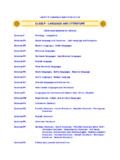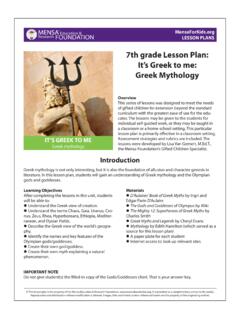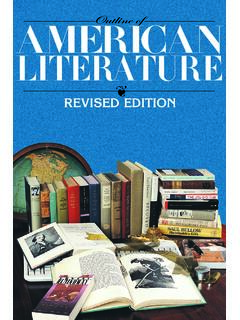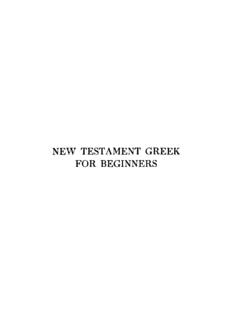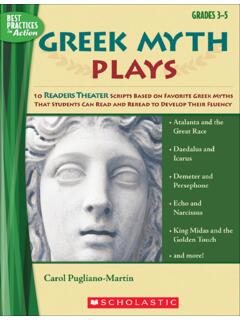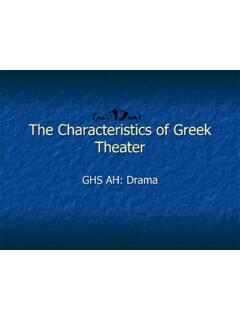Transcription of EARLY PERIODS OF LITERATURE - C-N
1 EARLY PERIODS OF LITERATURE These PERIODS are spans of time in which LITERATURE shared intellectual, linguistic, religious, and artistic influences. In the Western tradition, the EARLY PERIODS of literary history are roughly as follows below: A. THE CLASSICAL PERIOD (1200 BCE - 455 CE) I. HOMERIC or HEROIC PERIOD (1200-800 BCE) greek legends are passed along orally, including Homer's The Iliad and The Odyssey. This is a chaotic period of warrior-princes, wandering sea-traders, and fierce pirates. II. CLASSICAL greek PERIOD (800-200 BCE) greek writers, playwrights, and philosophers such as Gorgias, Aesop, Plato, Socrates, Aristotle, Euripides, and Sophocles.
2 The fifth century (499-400 BCE) in particular is renowned as The Golden Age of Greece. This is the sophisticated period of the polis, or individual City-State, and EARLY democracy. Some of the world's finest art, poetry, drama, architecture, and philosophy originate in Athens. III. CLASSICAL ROMAN PERIOD (200 BCE-455 CE) Greece's culture gives way to Roman power when Rome conquers Greece in 146 CE. The Roman Republic was traditionally founded in 509 BCE, but it is limited in size until later. Playwrights of this time include Plautus and Terence.
3 After nearly 500 years as a Republic, Rome slides into dictatorship under Julius Caesar and finally into a monarchial empire under Caesar Augustus in 27 CE. This later period is known as the Roman Imperial period. Roman writers include Ovid, Horace, and Virgil. Roman philosophers include Marcus Aurelius and Lucretius. Roman rhetoricians include Cicero and Quintilian. IV. PATRISTIC PERIOD (c. 70 CE-455 CE) EARLY Christian writings appear such as Saint Augustine, Tertullian, Saint Cyprian, Saint Ambrose and Saint Jerome.
4 This is the period in which Saint Jerome first compiles the Bible, when Christianity spreads across Europe, and the Roman Empire suffers its dying convulsions. In this period, barbarians attack Rome in 410 CE and the city finally falls to them completely in 455 CE. B. THE MEDIEVAL PERIOD (455 CE-1485 CE) I. THE OLD ENGLISH (ANGLO-SAXON) PERIOD (428-1066) The so-called "Dark Ages" (455 CE -799 CE) occur when Rome falls and barbarian tribes move into Europe. Franks, Ostrogoths, Lombards, and Goths settle in the ruins of Europe and the Angles, Saxons, and Jutes migrate to Britain, displacing native Celts into Scotland, Ireland, and Wales.
5 EARLY Old English poems such as Beowulf, The Wanderer, and The Seafarer originate sometime late in the Anglo-Saxon period. The Carolingian Renaissance (800- 850 CE) emerges in Europe. In central Europe, texts include EARLY medieval grammars, encyclopedias, etc. In northern Europe, this time period marks the setting of Viking sagas. II. THE MIDDLE ENGLISH PERIOD (c. 1066-1450 CE) In 1066, Norman French armies invade and conquer England under William I. This marks the end of the Anglo-Saxon hierarchy and the emergence of the Twelfth Century Renaissance (c.)
6 1100-1200 CE). French chivalric romances--such as works by Chretien de Troyes--and French fables--such as the works of Marie de France and Jeun de Meun--spread in popularity. Abelard and other humanists produce great scholastic and theological works. Late or "High" Medieval Period (c. 1200-1485 CE): This often tumultuous period is marked by the Middle English writings of Geoffrey Chaucer, the "Gawain" or "Pearl" Poet, the Wakefield Master, and William Langland. Other writers include Italian and French authors like Boccaccio, Petrarch, Dante, and Christine de Pisan.
7 C. THE RENAISSANCE AND REFORMATION (c. 1485-1660 CE) (The Renaissance takes place in the late 15th, 16th, and EARLY 17th century in Britain, but somewhat earlier in Italy and southern Europe, somewhat later in northern Europe.) I. EARLY Tudor Period (1485-1558): The War of the Roses ends in England with Henry Tudor (Henry VII) claiming the throne. Martin Luther's split with Rome marks the emergence of Protestantism, followed by Henry VIII's Anglican schism, which creates the first Protestant church in England. Edmund Spenser is a sample poet.
8 II. Elizabethan Period (1558-1603): Queen Elizabeth saves England from both Spanish invasion and internal squabbles at home. The EARLY works of Shakespeare, Marlowe, Kydd, and Sidney mark Elizabeth's reign. III. Jacobean Period (1603-1625): Shakespeare's later work, Aemilia Lanyer, Ben Jonson, and John Donne. IV. Caroline Age (1625-1649): John Milton, George Herbert, Robert Herrick, the "Sons of Ben" and others write during the reign of Charles I and his Cavaliers. V. Commonwealth Period or Puritan Interregnum (1649-1660): Under Cromwell's Puritan dictatorship, John Milton continues to write, but we also find writers like Andrew Marvell and Sir Thomas Browne.
9 LATER PERIODS OF LITERATURE These PERIODS are spans of time in which LITERATURE shared intellectual, linguistic, religious, and artistic influences. In the Western tradition, the later PERIODS of literary history are roughly as follows below: D. The Enlightenment (Neoclassical) Period (c. 1660-1790) "Neoclassical" refers to the increased influence of Classical LITERATURE upon these centuries. The Neoclassical Period is also called the "Enlightenment" due to the increased reverence for logic and disdain for superstition.
10 The period is marked by the rise of Deism, intellectual backlash against earlier Puritanism, and America's revolution against England. I. Restoration Period (c. 1660-1700): This period marks the British king's restoration to the throne after a long period of Puritan domination in England. Its symptoms include the dominance of French and Classical influences on poetry and drama. Sample writers include John Dryden, John Lock, Sir William Temple, Samuel Pepys, and Aphra Behn in England. Abroad, representative authors include Jean Racine and Moli re.









